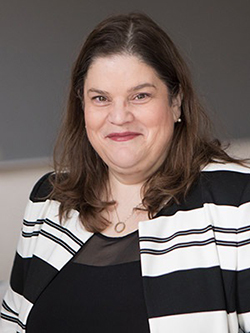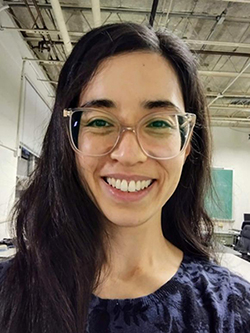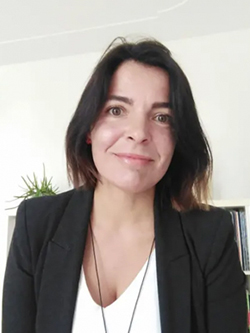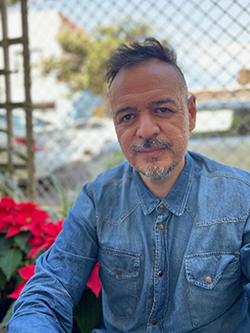Keynote Speakers

St. Francis Xavier University (Canada)
Inspired by Mi’kmaw Knowledge: Creating Space for Mathematics to Emerge
In 2006, Edward Doolittle suggested that rather than imposing mathematics on cultural practices and artifacts, it might make sense to begin in community and pull in mathematics as a need arises. This approach is something that has been a key idea in the decolonizing work I have done alongside Mi’kmaw communities. When we begin with interesting contexts or problems that honour and respect mi’kmaw knowledge systems, we create space for mathematical ideas to emerge in the context, thus creating greater cultural consistency, rather than cultural collisions. In this session I will share stories from my work that have been influenced by the knowledge learned from time spent alongside Elders and knowledge keepers within the Mi’kmaw community in Mi’kma’ki or what we now call Nova Scotia. Through exploration of examples, I will share ideas of how mathematics can live alongside community knowledge systems in ways that support rather than take away form cultural identity, language and culture.
Lisa Lunney Borden is a Professor in the faculty of education who holds the John Jerome Paul Chair for Equity in Mathematics Education striving to improve outcomes in mathematics for Mi’kmaw and African Nova Scotian youth. Lisa began her teaching career in We’koqma’q First Nation where she spent ten years as a secondary mathematics teacher, a vice-principal and principal, as well as the provincial mathematics leader for all Mi’kmaw Kina’matnewey schools in Nova Scotia. Lisa credits her students and the Mi’kmaw community for inspiring her to think differently about mathematics education which continues to shape her work today. She is committed to research and outreach that focuses on decolonizing mathematics education through culturally based practices and experiences that are rooted in Indigenous languages and knowledge systems. She is a sought-after speaker nationally and internationally and has a passion for working with teachers and their students. Lisa has helped to create the Show Me Your Math program that inspired thousands of Mi’kmaw youth to share the mathematical reasoning inherent in their own community contexts, and an outreach program called Connecting Math to Our Lives and Communities that brings similar ideas to Mi’kmaw and African Nova Scotian youth as an afterschool program.

Supporting youth’s socially engaged inquiry through the arts
Issues in such areas as mental health, spatial justice, and ethics in STEM, impact youth as much as they do adults. Yet, youth are among those with the least agency to address them. Through its creation and consumption, the arts offer a human perspective that invites both empathy and critical reasoning about these societal issues. Empirical inquiry through an arts lens can expand the ways in which youth engage with and understand the world, and empower them to address issues that matter to them.
In this talk, I offer examples from projects that engage youth in using arts-based methods to investigate personally and socially relevant issues. Through youth-created artifacts—including photography, dance, comic books, and interactive participatory storytelling—I will illustrate opportunities in the arts for disciplinary identity and engagement, and more broadly, for building research and data literacies. I will also reflect on the challenges of implementing interdisciplinary learning experiences in both formal and informal learning contexts. Overall, this work informs approaches to supporting youth in crossing disciplines, and thus, in preparing them to address societal issues faced now and in the future.
Camillia Matuk is Assistant Professor in the Educational Communication Technology program at New York University. She conducts design-based research on arts-integrated STEM learning experiences, with a focus on co-design, and on developing learners' research and data literacies. Prior to joining NYU, she completed a postdoc at the University of California, Berkeley, a PhD in the Learning Sciences from Northwestern University, a MSc in Biomedical Communication from the University of Toronto, and a BSc in Biological Sciences from the University of Windsor. Learn more about her and her team's work at RIDDLE, wp.nyu.edu/riddle/about.

Let's Steam ! Creative problem solving in interdisciplinary projects
Problem solving is a fertile research topic in mathematics that has contributed to advance the study of problem solving in other disciplines but also in interdisciplinary learning activities. After a review of problem solving in mathematics, we will focus on creative problem solving to engage the learner in a creative process in individual or collective settings (Romero, Giauffret, & Komis, 2020). We will introduce the techno-creative problem-solving framework (TCPS, Romero, Freiman & Rafalska, 2022) which allows for looking at problem solving and creativity from a computational thinking perspective while providing lenses to analyse the creative problem-solving process in interdisciplinary STEAM activities.
Margarida Romero is full professor at Université Côte d´Azur in France and an associate professor at Université Laval in Canada. After starting her career at the Universitat Autonoma de Barcelona where she was awarded the best doctoral thesis in psychology, she continued her career in Canada and France, where she set up the Laboratoire d’Innovation et Numérique pour l’Education (LINE), a research unit in the learning sciences. She coordinates the #Scol_IA Working Group on the educational challenges of artificial intelligence in education and co-directs the international MSc SmartEdTech program. Her research focuses on the study of transversal competencies, particularly in relation to computational thinking and creative problem solving.

Institut national polytechnique (Mexique)
Social Media, School Mathematics, and Epistemology
For some years I have been studying the way in which young people use the internet and social networks to express their emotions and perceptions about school mathematics, and as a source of mathematical help to clarify their doubts and solve school assignments. These studies show that the internet and social media have transformed the way students share their perceptions about the nature of school mathematics, but also the way they validate the mathematical knowledge they find on the web. In this talk I will provide some examples about these manifestations that point towards a social epistemology of school mathematical knowledge.
Mario Sánchez Aguilar is Associate Professor in Mathematics Education at the National Polytechnic Institute of Mexico. He has a PhD in mathematics education research from Roskilde University in Denmark. Mario serves as Associate Editor for the research journals “Implementation and Replication Studies in Mathematics Education” and “Educación Matemática”. He also serves as leader of the Thematic Working Group 23 “Implementation of Research Findings in Mathematics Education” of the twelfth Congress of the European Society for Research in Mathematics Education (CERME12) to be held in February 2022. He is visiting professor at the University of San Carlos of Guatemala.






